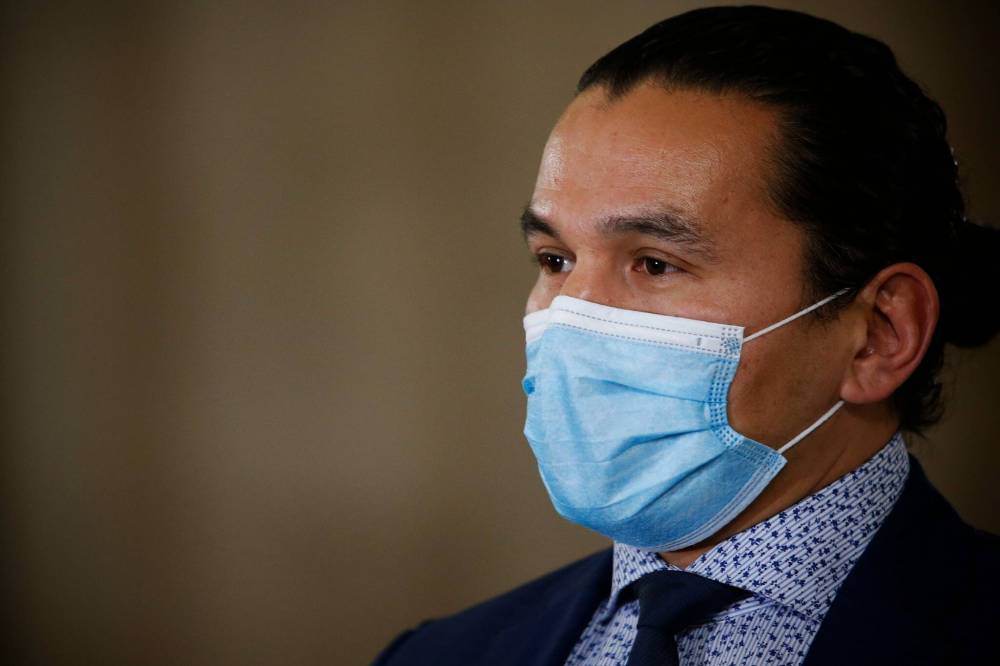Wait and see Task force prepares first report on solutions to surgical backlogs
Read this article for free:
or
Already have an account? Log in here »
To continue reading, please subscribe:
Monthly Digital Subscription
$19 $0 for the first 4 weeks*
- Enjoy unlimited reading on winnipegfreepress.com
- Read the E-Edition, our digital replica newspaper
- Access News Break, our award-winning app
- Play interactive puzzles
*No charge for 4 weeks then billed as $19 every four weeks (new subscribers and qualified returning subscribers only). Cancel anytime.
Read unlimited articles for free today:
or
Already have an account? Log in here »
Hey there, time traveller!
This article was published 16/01/2022 (827 days ago), so information in it may no longer be current.
The province is expected to reveal this week how it plans to start delivering more than 150,000 delayed procedures and surgeries, as frustrated patients continue to languish on wait lists.
Nearly six weeks after it was announced by Health Minister Audrey Gordon, the province’s diagnostic and surgical recovery task force is prepared to provide its first progress report by the end of the week, a spokesman for her office said.
An interview request with Gordon and task force project manager Matthew Lister on Monday was declined. Last month, Lister said a timeline to clear the surgical backlog could be included the update. The report is also expected to contain benchmarks to measure progress and a situational analysis.

Opposition NDP leader Wab Kinew said the Progressive Conservative government’s response to the growing backlog has not matched the severity of the situation, noting more than $36 million set aside to address backlogs has yet to be spent.
“The thing that concerns me with the lack of urgency from the government is that it seems as though they forget that these are people who are suffering in pain,” Kinew said. “These are people who are getting sicker and the after effects of people being on this surgical and diagnostic waitlist are going to be with us long after the pandemic.”
“The thing that concerns me with the lack of urgency from the government is that it seems as though they forget that these are people who are suffering in pain.” – Opposition NDP leader Wab Kinew
Any announcement that lacks a timeline commitment amounts to an “illusion of action,” he added.
“If we don’t have those deliverables attached to timelines, then it’s going to be pretty clear that the government is intending to evade accountability,” Kinew said.

The local advocacy group and physicians’ association Doctors Manitoba estimates the backlog includes nearly 60,000 surgical cases and more than 95,400 diagnostic cases. The total backlog grew by an estimated 1,204 cases in December.
For some Manitobans, efforts to reduce lengthy surgery delays come too late.
After waiting nearly four weeks in a hospital bed for a back surgery that was delayed about 12 times, retired firefighter David Reid finally had his operation in late October.
The 87-year-old who has spinal stenosis was profiled by the Free Press a day before he received the surgery. Three months later, Reid remains bedridden in hospital waiting to be moved to a palliative care ward after a recovery marred by contracting COVID-19.
Friend and caregiver Frank Leswick attributes Reid’s rapid decline post-surgery to the wait at the Health Sciences Centre, during which his friend lost his strength and ability to use a walker while mostly confined to a bed.
“The operation was major and it took everything away from him,” Leswick said. “He can’t walk, he has to be fed by hand… it’s been a s—- show what has happened to this man who was 36 years in the fire department, and very well respected — because beds weren’t available.”
“The operation was major and it took everything away from him (David Reid).” – Frank Leswick, friend and caregiver
On Monday, Shared Health was unable to say how surgical volumes through December compared to pre-pandemic levels. One of the task force’s stated goals was to restore surgical activity to pre-pandemic baselines early this year.
However, due to the rapid rise of the Omicron variant in the province, surgical activity has been reduced to redeploy staff into critical care units.
Last week, surgical slates at Victoria General Hospital were reduced from three to one and endoscopy procedures were halved, while surgical slates at the Brandon Regional Health Centre were cut.
Surgical slates were reduced by two per day at Grace Hospital in Winnipeg this week.
“Our health-care system continues to work to balance the care for increasing numbers of COVID inpatients with the need to maintain as much surgical capacity as possible for patients who have been waiting for non-emergent, but important, procedures,” a spokesperson for Shared Health said in a statement.
Emergent and urgent surgeries, including cardiac and cancer procedures, continue to be prioritized, the spokesperson said.

Doctors Manitoba spokesman Keir Johnson said the physicians’ association has met multiple times with task force members over the past six weeks to relay concerns and to provide suggestions on how to address the backlog.
Doctors Manitoba spokesman Keir Johnson said the physicians’ association has met multiple times with task force members over the past six weeks to relay concerns and to provide suggestions on how to address the backlog.
Some suggestions included engaging rural doctors, ophthalmologists and gynecologists, and moving some surgeries and diagnostic procedures outside of the hospital setting.
Johnson said while physicians are disappointed hospitals don’t currently have the capacity to handle a surge of COVID-19 patients and address the backlog, they understand the current constraints in the system.
Doctors are also hoping to see action by the task force to address staffing issues that make operating rooms vulnerable to disruptions caused by COVID-19 demands, Johnson said.
“We’ve appreciated the openness of the task force members to listen to this advice,” Johnson said, describing the meetings as highly constructive.
“At the end of the day the expectations are really high for some action,” he added. “I don’t think they’re going to meet everybody’s expectations the first update they do, but we’re optimistic that they’re going to be able to show some action even as they’re so limited with their options right now because of Omicron.”
danielle.dasilva@freepress.mb.ca

Danielle Da Silva
Reporter
Danielle Da Silva was a general assignment reporter for the Free Press.
History
Updated on Monday, January 17, 2022 7:12 PM CST: Adds web headline
Updated on Monday, January 17, 2022 10:18 PM CST: Fixes typos








